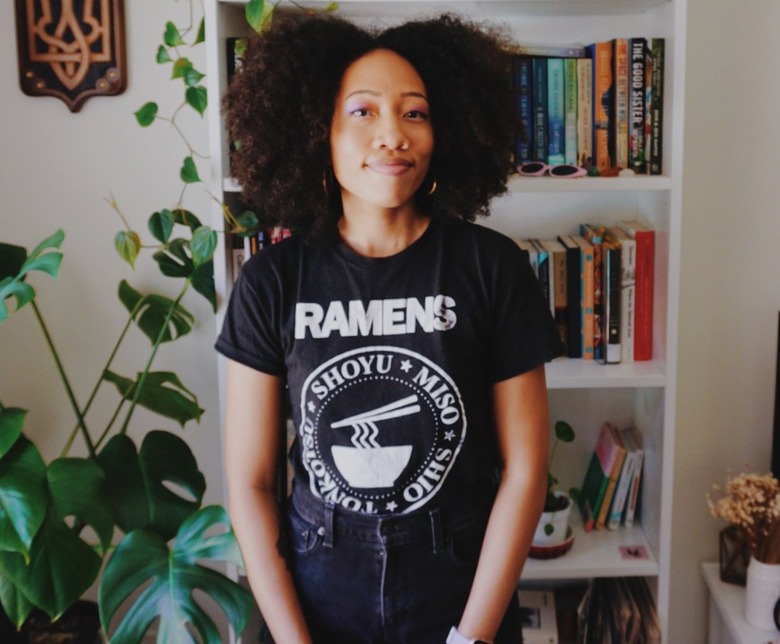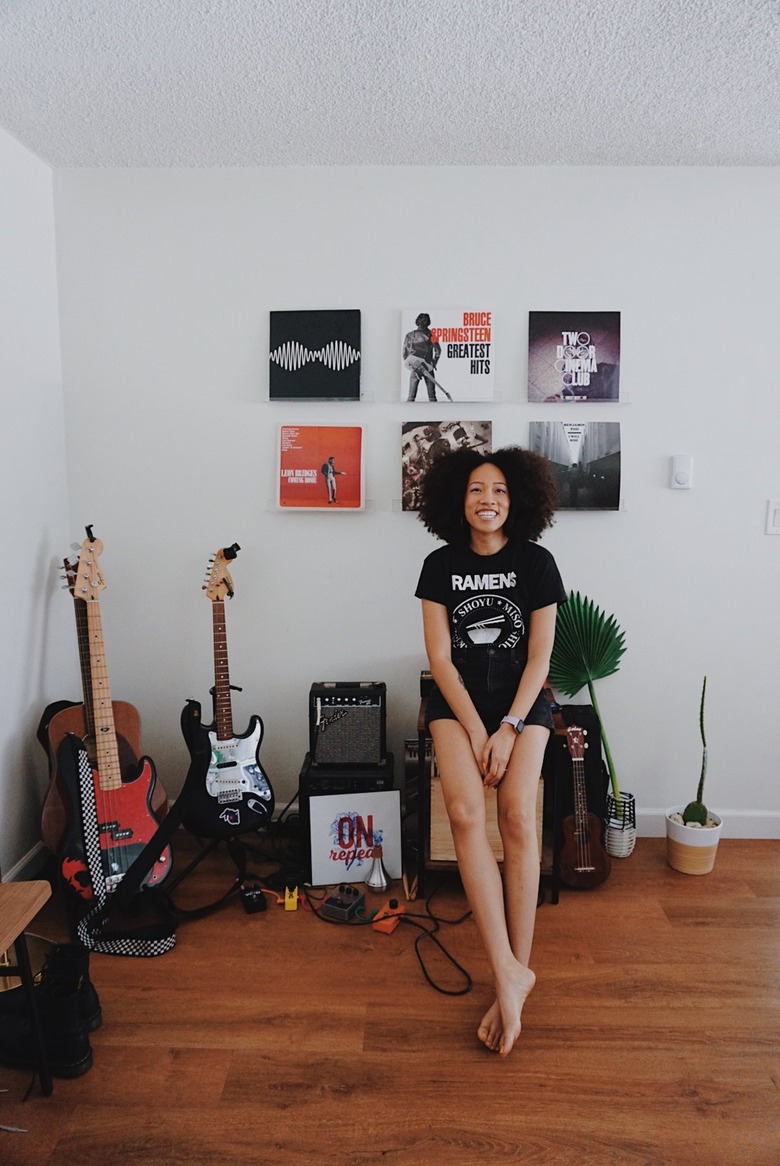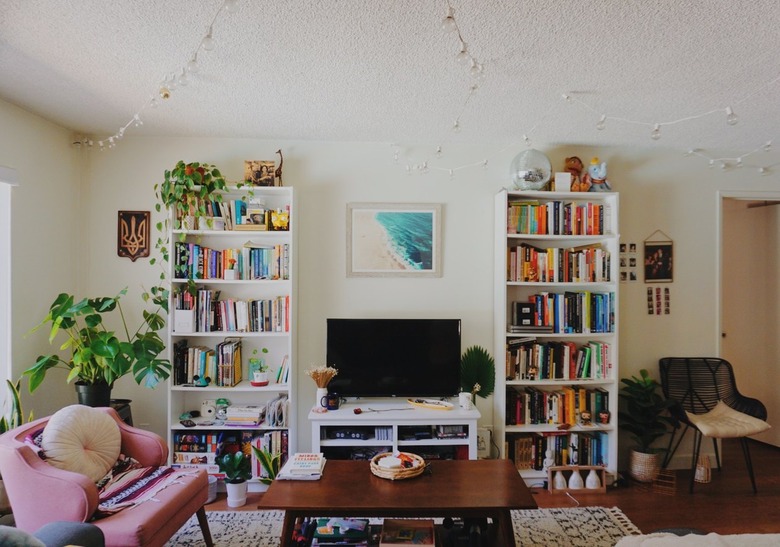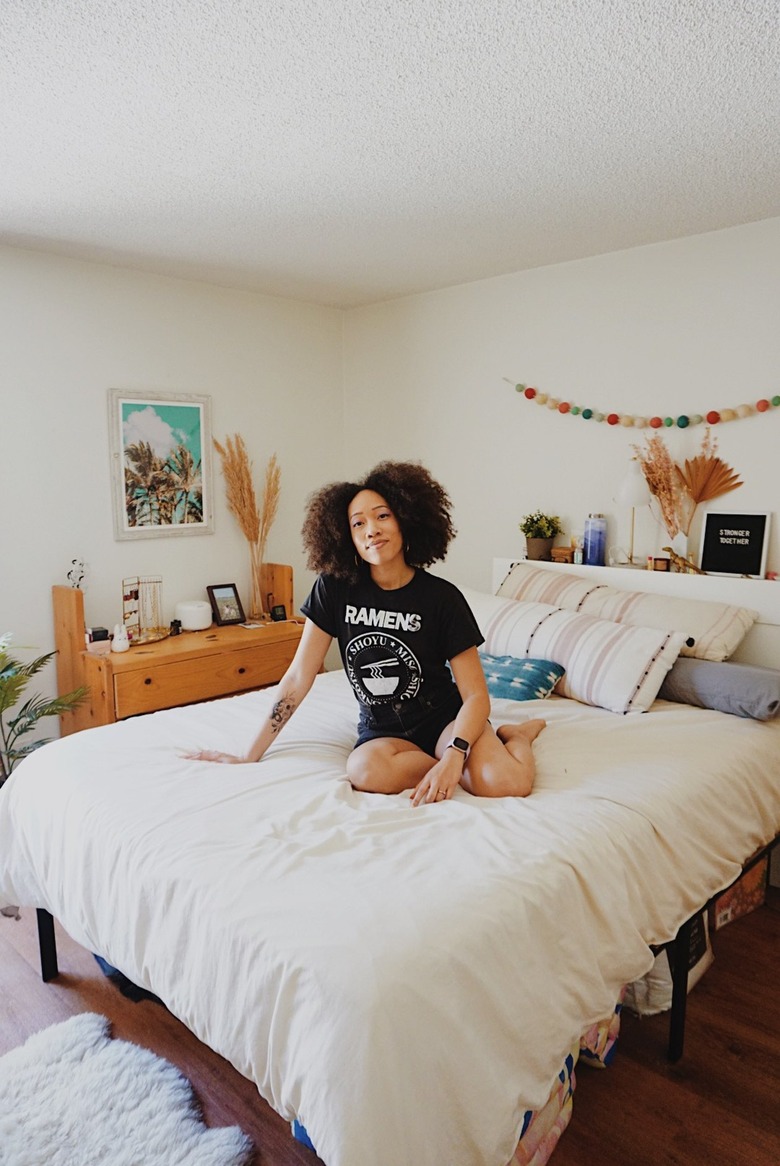Jenay Ross On Writing, Plants, And Finding Comfort At Home
Jenay Ross sits in a pink armchair in her Los Angeles apartment, in front of a fiddle leaf fig and a white bookshelf lined with colorful books. One leg tucked under the other, she reads her poetry from a black Moleskine notebook as sunlight filters into the room. "i'll find my voice in the quiet," she reads. "everything has been so loud, i lost myself somewhere in the shuffle."
The same style Ross that radiates in this video of her reading — warm, personal, honest — shows in all of her work: her poetry, blog, and Instagram, where, along with her poems, she shares book reviews, family stories, and snapshots of her life at home with her fiancé.
By day, Ross works in influencer marketing at FabFitFun, which has given her insight into the other side of the world she navigates as a content creator. Four years ago, while going through a difficult time, Ross began getting serious about poetry, using it to work through her feelings. She created "Thank You For Being Here," a beautifully produced digital zine that combines her poetry with photos of herself. After releasing four issues of the zine, she's now at work on her first book.
Hunke spoke with Ross about her poetry, her Chinese and Black identity, and how she and her fiancé make their space comfortable and full of meaning.
Hunker: What is the process like, for you, of writing a poem?
Jenay Ross: I jot down a lot of notes, whether it's on my phone or in a notebook. I like the feeling of hand-writing my poems in the beginning because I find I write better that way. Then I'll go in maybe like a week later or even months later to edit them. I have so many poems that I'm like, I don't know what I was writing, I just need to scrap that. But I'm usually proud that I at least got something on the page because some days it's pretty hard to even do that.
Hunker: Where do you feel most at home?
JR: I'm honestly an introvert and I love being home and in my space. I'm with my fiancé every day because we're both working from home and that's been awesome. He's my best friend. I'm super comfy, like it's almost scary how comfy I've been with just being at home, but I love it so much. I just feel at peace. I feel like we really created an environment that works for us.
Hunker: What are some things that make your space as comfortable as it is?
JR: We really tried to make it feel homey. We have a ton of plants. That's because I went plant crazy last year, so we have about 14 plants right now. And then in our main space we have two pretty big bookshelves full of our books — we're both really big readers — and that's a reminder like, oh yeah, I could be reading right now instead of looking at my phone.
We also have a music corner with some of our favorite records on the walls, our guitars, and our record player so that it just feels like books and music are our thing and those are the centerpieces of our main space.
Hunker: In your zine, you pair your poetry with photos of yourself. How did you decide to put those two things together?
JR: I wanted to stand out a little bit and to really put my face onto it since they are my stories and my feelings, to show that this is the person that's speaking to you right now. Of course I want people to be able to take what I'm writing and see their own experiences reflected in it, but I feel like it's important also to know who that story is coming from initially. Another part of it is representation. Maybe someone out there is like, oh, I can't do that, but this person looks like me, so maybe I could do that too. When I'm reading someone's work, I personally like to know what they look like.
Hunker: This is a feeling that I have, that I wonder if is true for you too, that as a multiracial person who doesn't see a lot of people who share my experience, I feel like I've kind of honed my ability to look for people who are like me and I'm kind of always looking for them and I'm really happy when I see them.
JR: Yeah, for sure. I get so excited, it's like, oh, there's more out there. And you have a little extra-special connection to that person when you can see that. I think it's important.
Hunker: Do you remember the first time you connected with someone who shared your identity, and what that was like?
JR: It's honestly probably really recent. I didn't really grow up around anyone that was part-Asian and part-Black. I grew up in a very diverse town and went to a very diverse school, but there was pretty much no one like me. Recently I've met a few more — there's one really good friend of mine, her name is Masako, she's half Japanese and half Black, so I feel like she's the one person that really understands. We were chatting the other day kind of with all the craziness happening, being like, wow, we're just — every day there's a news piece about either the Asian community or the Black community, and it's exhausting to have to see it every single day.
Hunker: Do you feel like, through writing, you've been able to find more community that you share experiences with?
JR: Yeah, I do, because when I'm writing about identity, I usually get some feedback from people. Sometimes certain lines will resonate with people in a way that maybe I didn't even expect. I also love when people are like, you put into words how I've been feeling and I didn't know how to put into words. It's nice for me to hear that because it's like, well I've been trying to figure out how I felt about it too and how I want to put it into words. It's nice when someone understands.
Hunker: I read that you grew up with just the Chinese side of your family and that it took time for you to process your identity and see that you are enough as you are. Can you talk a little about how you got there?
JR: Growing up with just the Asian side of my family was amazing, like, I love my family and it was a happy childhood. But of course you kind of are thrown through a loop when you look nothing like who you're surrounded by. It was like, Am I Chinese enough? Am I Black enough? What does that mean? Do I care? Do I need to be either/or? So many questions.
But as I got older, I realized that I didn't need to be a certain way. Being Asian doesn't mean you're one thing. Being Black doesn't mean you're one way. There's so many layers and multitudes for everybody. Lately I'm feeling the most comfortable with being like, I'm just who I am and it's awesome that I get to celebrate and be a part of both cultures instead of it kind of weighing on me like it's a negative thing or something that's holding me back.
Hunker: Do you have certain self-care practices within your own daily routine that help you stay centered as you share your work and build your platform?
JR: I like to journal. I journal a lot, I read a lot. Usually in the morning I like to get a hot cup of water and then read and journal for an hour before I get into my day job. But it depends. You can get sucked in so easily to Instagram. I feel like I've been better about it now. I've been unfollowing and muting more people, which has helped so that I'm not too overwhelmed with what I'm swiping through. I'm trying to be more intentional about that, and I don't want to feel bad for unfollowing or muting someone like I used to.
Hunker: What are three things in your home that hold the most value to you, excluding people or creatures?
JR: One of them is my grandfather's watch. He passed away about four years ago, and his watch is sitting next to a portrait of him and I together, so I love having that. That's just a part of my childhood. My book collection is very important to me, especially the books that I've had for a long time. I have a lot of photos that I love — especially a photo strip that my fiancé and I took at a bar after we got engaged.



